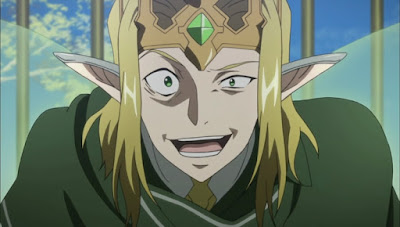With a new season upon us, it's that time once again when we decide
which shows are worth following. But how to separate the good shows
from the bad, armed with little more than a staff list and
paragraph-long synopsis? Well, I've found myself following a
tragically useful rule: don't watch what's based on a light novel.
Of course I hate myself for saying this. It's wrong to damn one
genre completely for any reason; there will be both good and bad
representatives at any given time. But there's such a glut of samey
me-too content right now that I feel like taking a break from light
novel adaptations for a while.
How did it get this way? It would be easy to blame Sword Art
Online, the critically-panned series that nonetheless enjoys
insane profits. But light novel adaptations have been around for
years before, not only selling well but winning praise also, such as
Gundam Unicorn, Spice & Wolf, and the
Bakemonogatari franchise. Others may not have made bank right
away, yet remain fan favorites. How many times has Baccano
been given a physical release? Likewise, Durarara took a few
years to get a sequel, but it's doing fine now. True, it wasn't
until Sword Art Online's unexpected success that anime
producers seemed to collectively say, “Let's milk the shit out of
this genre”, but blaming this one show would just be unfair
considering what came before.
That lazy attitude is the biggest strike against current light novel
adaptations. I'd happily watch more if the shows covered a healthy
variety of topics, but they don't. Seriously, try to find one where
the hero isn't attending superpowered magic high school or trapped in
a video game. Beyond that, you can just go down a checklist: the
main character is arbitrarily weak but secretly the strongest,
there's a harem of potential lovers after him, and everyone will
waste countless minutes explaining how this world is actually
so much more complex and works better than all those other
identical fantasy settings. Seemingly zero effort is made to make
the show unique in any way, which might actually be the case; I've
heard rumors that making even a subpar adaptation is guaranteed to
significantly boost sales of the actual novel, so maybe that's the
true goal. Regardless, why should we the viewers dump our time into
a story we've heard many times before?
Surprisingly, I find hope by looking at the recent history of moe
anime, which has already gone through a similar cycle. Starting with
acclaimed works like Azumanga Daioh, it soon devolved into a
deluge of feel-good fluff. Now there's not only fewer such shows out
there, they're better. I find many series by PA Works tend to tend
to write their characters with complex thoughts and emotions despite
them having the trademark huge eyes, no noses, and generally squishy
faces of moe designs. Last year's School Live! ambitiously
combined that genre with horror to produce some surprisingly
heartfelt moments. Long story short: the fans stopped buying the
load of samey crap thrown their way, so the creators had to put more
effort in to keep selling.
Even if we are in the middle of a dry spot for creative content, I
can't actually boycott light novel adaptations one hundred percent.
The Bakemonogatari franchise is still great, as it has been
for years before this started. And every so often something will
stick out from the crowd for better (Shimoneta) or worse
(Gate), so of course I have to investigate; hell, I'm
following one or two such shows this season because they generated
decent buzz. But in general I've become much, much more cynical
towards the genre because it's given me few reasons not to. Not
until we collectively act like self-entitled snobs will creators
throw out that imaginary checklist and start making light novel
adaptations with more care and variety. Let's face it, that day
can't be too far off; who acts snobbish better than anime
fans?








